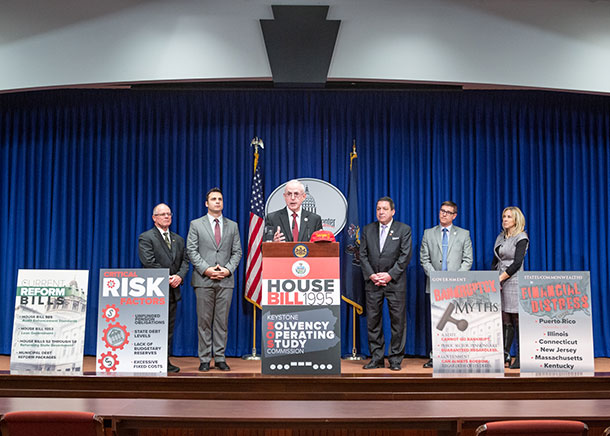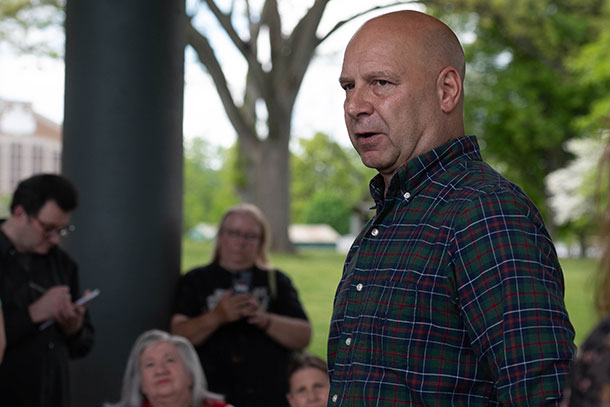Can a State Erase Property Taxes Without Wiping out Education?

An aerial view of a portion of Kunkletown, Monroe County. Alex Potemkin/Getty Images
The long, difficult and ongoing quest to reduce property taxes in Pennsylvania.
This article was first published by Route Fifty partner publication City & State Pennsylvania.
In 2015, an effort to eliminate Pennsylvania’s school property tax system failed by one vote, with Democrat Mike Stack, then the state’s lieutenant governor, casting the tie-breaking vote to kill the plan. In the days that followed, Stack explained his vote, arguing that the bill would have left a “billion-dollar black hole” in the state’s public education budget. The proposal would have shifted the state’s school funding system from one based on local property taxes to one underwritten by a combination of increased sales and personal income taxes.
For years, property taxpayers have been itching for a solution that brings down their tax burdens, while education advocates and school district officials have been cautious to upend a system that is reliant on property tax dollars. The result is a complicated and ongoing push to bring down property tax costs in the short term while also ensuring schools have adequate funding – and keeping the prospect of full-scale property tax elimination in view at the same time.
The sheer complexity associated with overhauling the state’s tax laws has made property tax elimination a heavy lift in Harrisburg. It even prompted some lawmakers to put full-scale elimination on the back burner while they pursued other options, including plans that sought to increase financial assistance to homeowners and reduce property tax bills, rather than eliminate them entirely.
Just this year, lawmakers approved a temporary expansion of the state’s Property Tax and Rent Rebate program, which provided an additional $140 million in financial relief to eligible taxpayers.
But with a potential recession looming over the country, fears are mounting that a lack of action on property tax reforms could result in compounding economic hardships for families who are already struggling with inflation and the high costs it has brought to everyday life.
“If we don’t solve this problem and fix this tax code in the commonwealth, it will be the (straw) that breaks the camel’s back,” said Republican state Rep. Frank Ryan, who has long advocated for the elimination of the current property tax system. “This is the No. 1 issue that needs to be addressed to keep Pennsylvania solvent.”
According to data from the state’s Independent Fiscal Office, Pennsylvanians paid $21.5 billion in property taxes in 2020, which represented 2.7% of total income. The office developed a “property tax burden” for each county, calculated using a ratio of total property taxes to total income.
Monroe County had the largest property tax burden of all 67 counties, with the IFO finding that Monroe County residents paid a total of $427 million in property taxes, making up 5.14% of the total income for those living in the county. Pike County was second, with a tax burden of 4.33%, followed by Sullivan County (4.1%), Northampton County (3.76%) and Wayne County (3.71%). Berks, York, Lehigh, Greene and Delaware counties rounded out the top 10.
The IFO analysis also determined that, generally speaking, rural counties had higher property tax burdens “because those counties have relatively larger elderly populations and lower per-capita income levels.”
State Sen. Mario Scavello, a Republican from Monroe County, has developed a reputation for telling harrowing stories of constituents struggling under the weight of property tax payments. During a 2019 public hearing on elimination hosted by the Senate Republican Policy Committee, Scavello told of Pennsylvania residents forced into financial plight by ballooning real estate taxes.
One constituent, Scavello said, was slated to lose her family home. Another 88-year-old resident wrote to Scavello telling him about how she was forced to make decisions between paying for food, paying for clothes and paying her property tax bill. He also relayed a story about a man who attempted suicide after learning that his house was going to be foreclosed upon.
“We can’t have too many more of these meetings,” Scavello said at the time. “We need to solve the problem and if we don’t do it for everybody – do seniors. We need to do something.”
Ryan said that a lack of action from state lawmakers could result in more and more people facing dire consequences. “I tell everybody – and they tell me – they are about one life event away from losing their home.”

But for all those who say the state needs to fully – and permanently – replace the state’s property tax system, there are also those worried about the impact such a plan would have on school funding, since local school property taxes provide a significant source of funding for the state’s 500 school districts.
“You can’t eliminate property taxes without having a plan on the other side for what you’re going to do going forward,” Hannah Barrick, the executive director for the Pennsylvania Association of School Business Officials, told City & State in an interview. Barrick said the association previously opposed certain property tax elimination plans that it felt were too simplistic.
Barrick said PASBO is “very supportive” of property tax relief efforts, but stressed that future conversations about replacing the property tax system need to be more comprehensive and factor in mandated costs experienced by school districts, such as pension contributions, special education costs and payments to charter schools.
“The challenge really is trying to understand what school districts need to operate,” Barrack said. “Why do districts have property taxes in the first place? What are the costs that are driving education? You’ve got a lot of mandated costs – pensions, special ed, charter school tuition. All of those things are really the reason why property taxes exist and continue to increase in some districts.”
The timeline for when state lawmakers could revisit the great property tax debate could hinge on the results of next month’s elections – where the governor’s office and most of the seats in the General Assembly will be on the ballot.

Ryan, the outgoing Lebanon County lawmaker, said he believes the political will still exists in Harrisburg to get property tax elimination to the governor’s desk. However, what happens once a prospective bill gets to that desk is another question.
With Gov. Tom Wolf slated to leave office in a few months, any changes to the state’s property tax system will likely be handled by the next governor. Each of the five gubernatorial candidates that will appear on the ballot this year support using the power of the office to lower property tax bills and re-think education funding, but in different ways.
State Sen. Doug Mastriano, the state’s GOP nominee, did not respond to a request for comment about how he would address property taxes as governor. His campaign website describes property taxes as an “unfair burden,” and says Mastriano will “immediately establish a Property Tax Elimination Taskforce to find a way to get this burden off of hardworking Pennsylvania homeowners.”
Mastriano has also sponsored legislation in the state Senate that would eliminate property taxes for people over the age of 65 who have an annual household income of $40,000 or less and have lived in the state for at least 10 years. That bill has not yet received a committee vote.
Democrat Josh Shapiro, his general election opponent and the state’s attorney general, has proposed a number of reforms to state tax laws since launching his campaign for governor, like eliminating a sales tax on cell phone service, but he hasn’t publicly backed the elimination of the property tax system like Mastriano has. Instead, Shapiro has championed an expansion of the state’s Property Tax and Rent Rebate Program, which provides financial assistance to those over the age of 65.
Under current law, the maximum rebate is $650, but some homeowners may qualify for rebates of up to $975 thanks to other supplemental rebates. Eligibility for the program is limited to those with an income below $35,000, and renters may only qualify if their annual income is $15,000 or lower.
Shapiro is proposing an expansion of the program, increasing the maximum rebate to $1,000, and increasing the number of people who are eligible. Per Shapiro’s plan, 275,000 more people would be eligible for relief. A spokesperson for Shapiro said he intends to make expanding the state’s existing property tax rebate program a top priority, if elected. “Josh Shapiro knows too many Pennsylvanians are struggling right now, and we must do more to make real, lasting change that will help people all across the Commonwealth dealing with inflation and high costs,” said Shapiro spokesperson Manuel Bonder. “As Governor, Josh will bring Democrats and Republicans together to expand the Property Tax Rent Rebate program in order to cover more seniors and put more money back in their pockets.”
“While Josh is focused on a real plan to provide relief for Pennsylvania families, Doug Mastriano is continuing to push a reckless agenda to bankrupt our schools with no plan to pay for it,” Bonder added, criticizing Mastriano over his education proposals.
Pennsylvania’s third-party candidates for governor have also taken issue with the school property tax system.
Morgen Mogus, the campaign manager for Libertarian Party nominee Matt Hackenburg, said the Libertarian Party supports outright elimination of the tax at all levels. “The Libertarian Party supports eliminating not just the school property tax system, but the property tax entirely because we believe your community knows best how to spend that money on education,” Mogus said in an email.
Green Party nominee Christina “PK” DiGiulio told City & State that “funding schools through property leads to inequity” and suggested that policymakers should rethink how education is funded.

“A child’s ZIP code must not determine the quality of their education. There should be a fair funding system that supports the needs of each student and each community through an equitable process,” DiGiulio said, adding that government subsidies for fossil fuel projects and proceeds from legalized recreational marijuana sales could be used to bolster education funding.
Joe Soloski, who is the nominee for the newly formed Keystone Party, also prefers to do away with school property taxes. “The property tax system is the most archaic and most regressive tax system that we have,” he said in an email. “There is no rhyme or reason to it and it varies wildly from one county to another.”
Soloski suggested replacing the current property tax system with a county-based sales tax. “Completely eliminating the current property tax system and replacing it with a more competitive county sales tax system would go a long way to allowing people to retain ownership of their properties and increase a higher level of fairness that the current system lacks.”
Regardless of who occupies the governor’s mansion come next January, there is no shortage of factors that state officials must take into account as pressure mounts on them to reduce – or eliminate – property taxes. New revenue sources will have to be established. Additional rounds of rebates and other forms of relief will likely be distributed. Mandated costs faced by school districts will have to be reviewed.
With a particular focus on school district costs and mandates, Barrick said that all these factors should be viewed as a whole the next time policymakers consider taking action.
“There hasn’t been a thoughtful, long-term plan to ensure that school funding would be able to continue in a way that would meet those mandated cost increases and the needs of schools,” she said. “You could really balance all these things together if we took a step back and tried to approach it as a gigantic, connected mess, instead of trying to silo these things off one by one.”





